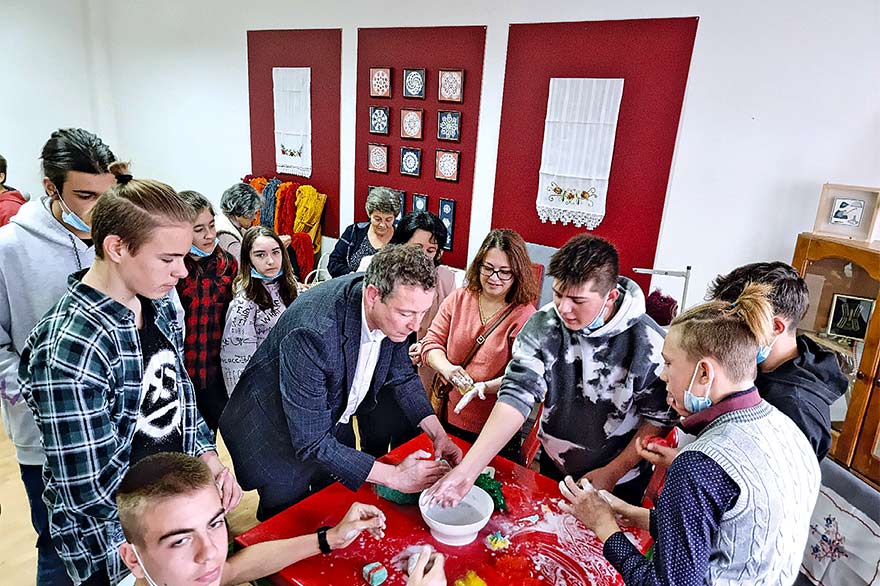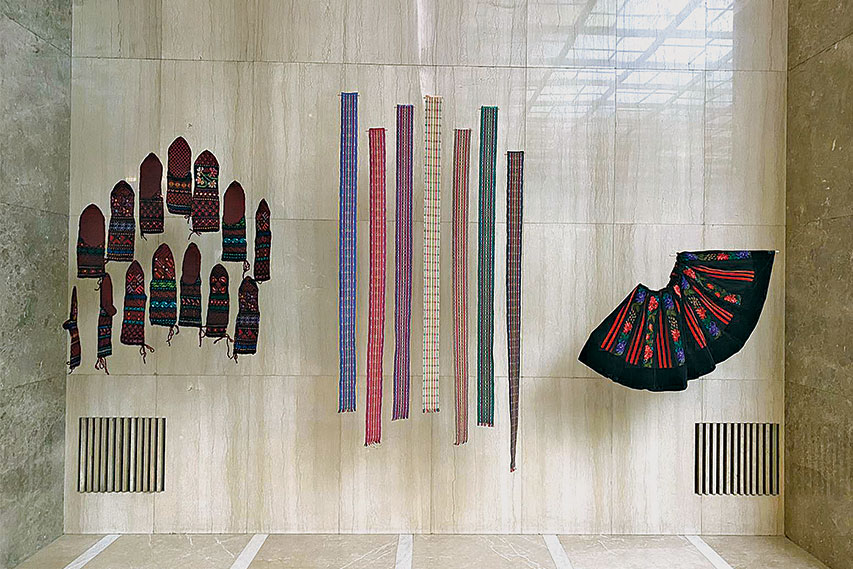There are many more women doing daily unpaid work than those making an average salary in Serbia. More than 60 percent of women living in rural areas are not formally employed or financially independent and are without permanent employment or a stable source of income
To change the statistic cited in the introduction, the Ethno Network, with support from the Canadian Embassy and the Canadian Fund for local initiatives, is implementing practical projects to economically empower women and young people making traditional crafts. This support system has also been tailored to cater for small organizations, with simple reporting procedures and resources available for more concrete interventions and responses to the needs of groups in the field.
Thanks to this funding, we managed to provide economic and psychological support to over a hundred women in Sombor, Sremska Mitrovica, Loznica, and Pančevo during the pandemic. These women attended the “Entrepreneur and Independent” workshops in order to connect and gain empowerment during these difficult and unpredictable times. In addition, by speaking to local decision-makers with the support of the organization UN Women, we defined measures that need to be taken to economically empower women, and have organized groups and training in the field of weaving and weaving techniques. The most successful participants also received the necessary equipment to do the work. The training in Pančevo was intended for teachers and educators, to help them organize more creative and successful workshops for children. Furthermore, after the weaving workshop in Sombor, a new society was founded that is now working to preserve national heritage.
To make sure that continued support is not just an unfulfilled promise, we have mobilized the municipalities of Odžak and Knjaževac to secure a space for local groups to work and sell their products. The province supports public works in the culture sector, and we also encourage this at the national level. The Ministry of Education has made Ethno Network programs available for training teachers as well. State institutions occasionally use ethno-crafts made by the women of the Ethno Network as business gifts and, thanks to cooperation with “Serbia Creates”, their work was also prominently displayed in the Serbian Pavilion at the Expo 2020 Dubai.
We continue to invest in particular programs that protect traditions and our heritage – by securing packaging and certifications, and by purchasing blocks of the products for the country’s protocol gifts and representation by our embassies abroad.
While Ethno Gallery in Belgrade is one of the goals we are yet to achieve, we have in the meantime secured sales booths at highclass hotels – Hyatt, Indigo, Metropol and Crowne Plaza – that were willing to install presentation booths containing traditional and heritage-related items.

The Initiative “1000 women” has helped enhance the results of this project, which we are running under the patronage of Deputy Prime Minister Zorana Mihajlović and the president of the Coordinating Body for Gender Equality. This is all done to ensure that, after decades of unemployment and being shunned in the labour market, hundreds of women will be job-ready and empowered. They will gain useful weaving skills, which will enable them to make a living by doing this creative work. This initiative has been in force since 2017 and we have so far spent over 22,000 hours working to arrange training and public works, and on establishing craft items as business and diplomatic gifts.
As we continue with the project with the support of the Canadian Fund, we are striving to restore the importance and status of these handmade crafts as symbols of our identity, and women as their guardians and promoters. In order to properly represent the crafts at expos and events, we have arranged for a booth to be used for the presentation and promotion of these products. We have also started exhibitions of authentic craftwork done by craftsmanship organizations from Pančevo, Odžak, Bela Palanka, Knjaževac, and Kladova in the Palace of Serbia building.
While thanking the diplomatic community, we invite our government officials to recognize this forgotten societal and economic value and to contribute directly, through tangible support measures. We also call for a more equal political regime that would not only benefit women, but society as a whole
The exhibition consists of recognizable elements thst are listed nationally as part of the not-for-profit cultural heritage, such as inspired motifs from Pirot and Stapar carpets, lavish Vlach embroidery from the Timočka Krajina region, and the famous Banat pattern by Jovanka Poznanov. It also promotes carving, embroidery, and weaving techniques. All of the products have the Ethno Network stamp of approval and are colorfully and visually integrated to create a harmonious composition.
The exhibitions also harmonize with the goals of the “1000 women” initiative, which has ensured frequent presentations in the government building in Nemanjina Street (Serbian Salon) and the Banovina building in Novi Sad (Vojvodina Salon). The reasoning behind displaying them in these institutions is to show these crafts in a gallery-like setting, bringing back the dignity of the craft through the promotion of the heritage and cultural identity of Serbia as a foundation for the development of the local economy and the empowerment of women and young people.

Supporting these efforts is the wife of the Ambassador of Canada, Valerie Lane, who readily engages as a host and sponsor of Ethno Network initiatives, our exhibitions, workshops, and groups. Mrs. Lane, supported by her husband, helps us selflessly. She actively encourages her dilomatic colleagues and heads of donor organizations to offer full support to the programs that empower women.
While thanking the diplomatic community, we invite our government officials to recognize this forgotten societal and economic value and to contribute directly, through tangible support measures. We also call for a more equal political regime that would not only benefit women, but society as a whole. By creating specific programs that do not cast women from rural areas in a particular social category, and creating a society more accepting of employed and successful women, we can create a culture in which more women would be encouraged to assure they are employable and can live independently, with the help of their community, and furthermore to take leading positions in our society. For this to happen, women need to believe in themselves and their abilities, work hard and make decisions independently. To advance more rapidly, everyone involved must work together: the government, businesses/politicians, media, and women themselves, who need to take ownership of their careers and not hesitate to present the results of their hard work publicly, something they often leave to men.